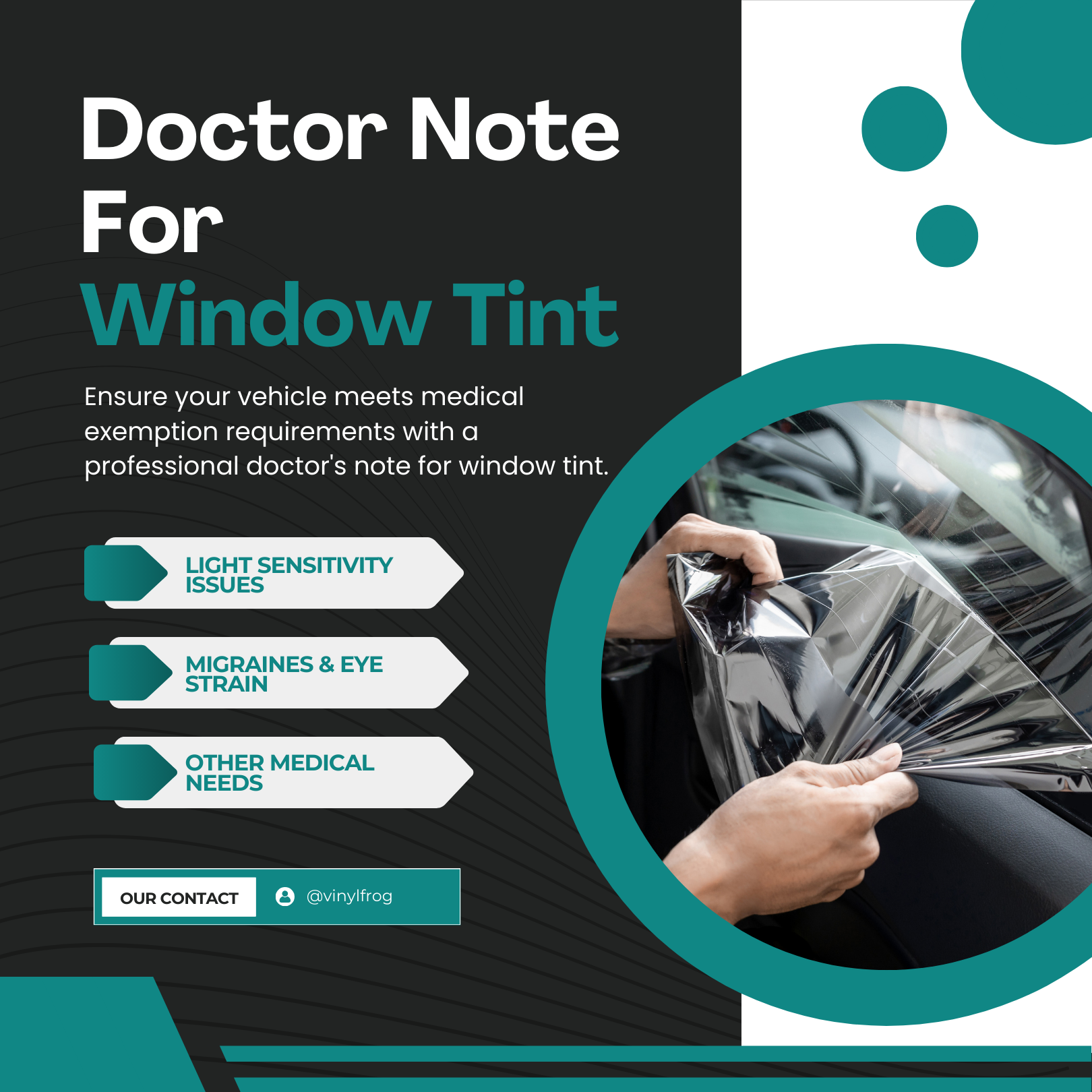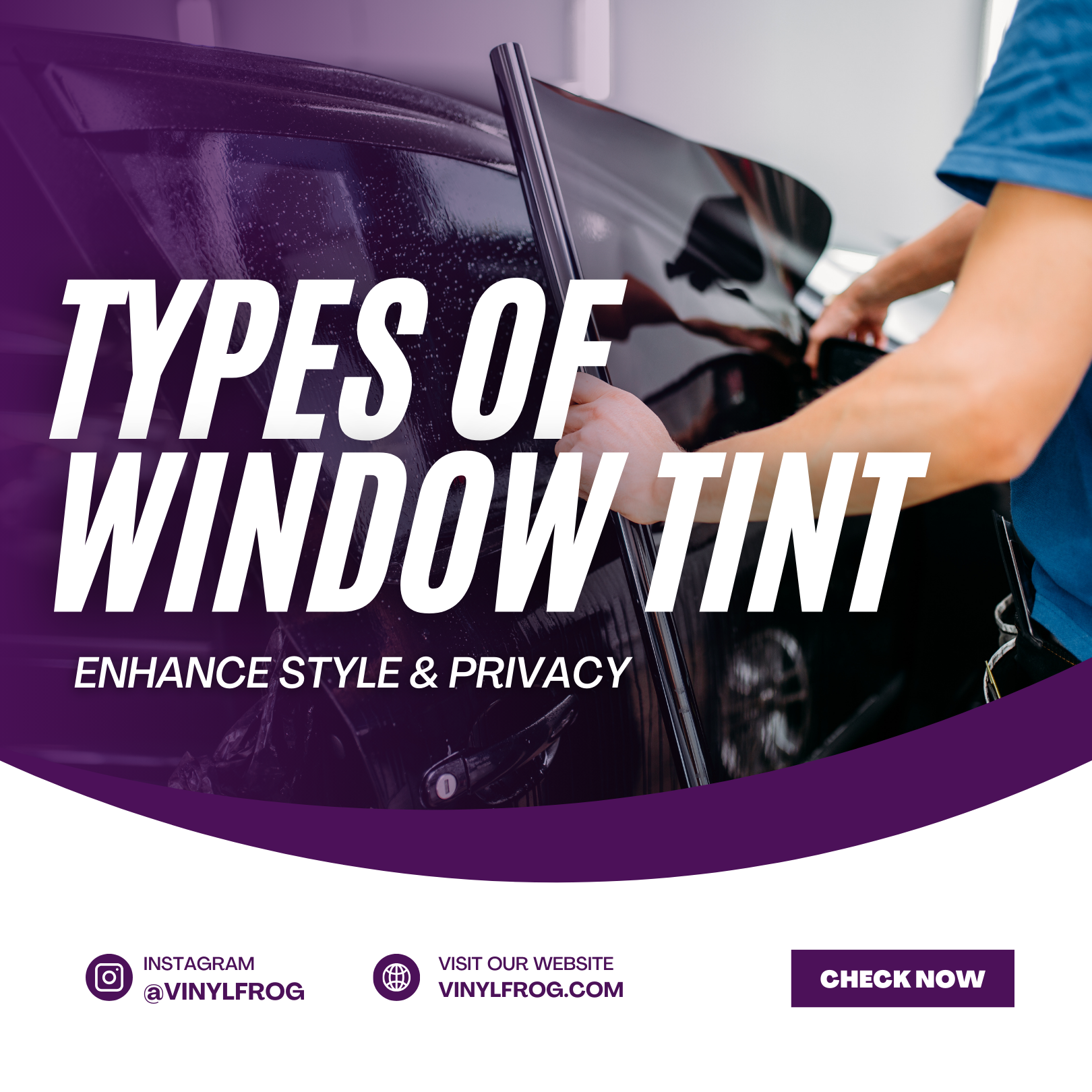Posted By Vinyl Frog On May 13, 2023
New Jersey Window Tint Laws - Everything You Need To Know

The New Jersey window tint laws, enforced in 2003, are well-defined and not as stringent as in some other states. If you reside in New Jersey and want to get your windows tinted, you will have to be abreast with the related laws so you may not get in trouble with the authorities. We have presented a detailed description of everything you need to know about the tint laws in NJ.
What Are Window Tint Laws In New Jersey?
Here’s what you need to know about the tint laws as far as types of vehicles are concerned:

Passenger Cars
In New Jersey, the law mentions that passenger cars (including Sedans, SUVs and vans) cannot have window tints on the front windshield or the front windows, both the passenger and driver’s side. Minimum 70% of visible light should be transmitted through the front windshield and the front side windows at all times.

70 Percent Window Tint
You can apply tint film above the AS-1 line of the windshield. The AS-1 line is parallel to the very top of your car’s front windshield. It is normally 5 inches wide. It is also known as the visor strip for most automobiles.
The rear side windows and rear windshield can have any level of tint darkness, but the total light transmission through the rear side windows and rear windshield must be at least 30%.
Trucks And Other Non-Passenger Vehicles
ew Jersey's window tint laws for trucks and other non-passenger vehicles are the same as for the passenger cars. You cannot apply tint to the front windshield and the front side windows. A minimum of
Tint Light Reflectance Law In New Jersey
The laws in New Jersey are also clear about how reflective a window tint can be when applied on a vehicle. There are some window tints that reflect light to reduce glare and heat inside the interior cabin of the vehicle. Under normal circumstances, you cannot apply reflective tints to your car windows in New Jersey. The visible light reflectance shall not exceed 8% and this is what a typical non-tinted window reflects.
New Jersey Window Tint Laws Medical Exemptions
New Jersey allows drivers to apply for an exemption to the window tint laws if they have a medical condition, such as ophthalmic or dermatological photosensitivity, that requires them to limit their exposure to sunlight. To apply for it, drivers must provide documentation from a licensed physician explaining their condition and the specific tint darkness needed for medical reasons. This allows them to apply such a tint on the windshield and the front side windows of their vehicle that increases visible light reflectance or reduces light transmittance.
The licensed doctor will have to certify in writing on the application that the person has a medical condition that involves photosensitivity. The details of the condition and the recommended treatment has to be mentioned as well. It should also include the specific wavelength or action spectra of light to which the patient is photosensitive.

Doctor Note For Window Tint
All tests regarding the condition, including the skin test for radiation wavelengths that elicit a photo-reaction, have to be submitted so that the Chief Administrator can determine the types of tints that may be permitted on the vehicle's windshield and the front side windows if needed.
The medical exemption certificate issued is valid for a period of 48 months and is considered terminated if the vehicle is sold or its lease is terminated. The owner of the vehicle for which a medical exemption certificate has been issued shall be responsible for the removal of the window tint from the windshield and the front side windows before selling the vehicle or the termination of the lease.

If you have been medically exempted, then according to New Jersey laws, you shall carry the certificate with you at all times. This will be readily shown to the police officer upon request.
The Law Of Labelling The Window Tint
In New Jersey, if you are applying the tint to your front windshield and the windows due to medical reasons, the company responsible for installation will have to label it. The label will be attached to the lower right corner of the windshield as viewed from the interior of the vehicle and must be completely visible from the front.

Window Tint Percentages
On the left and right side front windows, the label will be attached to the lower left corner and lower right corner respectively. It should be one inch by one inch in size, and must have the name of the window tint material and the registration number of the company that installed it.
Enforcing Window Tint Laws In New Jersey
In New Jersey, law enforcement officers are authorised to inspect the level of tint on a vehicle's windows during a routine traffic stop or inspection. They may use a device called a photometer to measure the amount of visible light transmitted through a vehicle's windows. The device is placed against the window and a reading is taken to determine whether the tint level is within the legal limit or not.
If a driver is found to be in violation of the state's window tint laws, they may be issued a citation and required to remove the tint or face fines. The fines for violating the window tint laws in New Jersey vary depending on the offence:

- First offence: Minimum $1000 fine.
- Second and subsequent offence: $5000 fine.
In addition to fines, drivers may also be required to remove the illegal tint before the vehicle can pass inspection or be registered. It's important to note that these regulations apply to all types of window tinting, including aftermarket film tint, coating tint, and factory tint. Drivers should consult with a professional tinting shop to ensure that any tint they install complies with New Jersey's laws and regulation.
Other New Jersey Window Tint Rules And Regulations
There’s more to New Jersey's window tint laws:
- There are no restrictions on the colours of tint that can be used on the rear windshield and windows.
- If the back window is tinted, dual side mirrors are required.
- Unlike in some states, manufacturers of window tint film do not need to certify the film they sell in New Jersey.
- There is no requirement for a sticker to identify legal tinting such as that of the rear windows and windshield.

It's important to keep in mind that the window tint laws in New Jersey are subject to change frequently, and their interpretation may vary from city to city or county to county. To ensure accuracy, it's recommended that you double-check the information provided in our blog with your local DMV or law enforcement agency.
Law For Window Tint Installers In New Jersey
According to the law of New Jersey, window tint sellers and installers have to inform the purchaser that it is not allowed to apply these films to the front windshield or the front windows to the left and right of the driver of any vehicle registered in the State. One has to post a clear notice where the tints are being sold stating in bold letters:
NJ STATE LAW PROHIBITS ADD-ON TINTING ON WINDSHIELDS AND FRONT SIDE WINDOWS.
One is only allowed to install a tint film to the windshield or front windows if the purchaser shows a certificate that he or she is authorised to do so due to medical reasons.
How To Select Window Tint In New Jersey?
When selecting a window tint for your vehicle in New Jersey, it's important to understand the state's regulations and choose a reputable installer. Consider the type of tint film you want, such as dyed, metalized, or ceramic, and choose a level of tint that balances your desired darkness with legal compliance.

Additionally, opt for a film that provides UV protection, which can help protect your skin and reduce fading of accessories in the interior cabin of your car. Practical considerations like reduced glare and heat reduction should also be taken into account, especially if you live in a sunny area or frequently drive during peak sun hours. By following these tips, you can select a window tint that meets both your aesthetic and practical needs while complying with New Jersey's window tint laws.
What Is The Need For Window Tint Laws?
The primary goal of window tint laws is to ensure safety on the roads. When drivers have excessively dark or reflective window tints, it can be difficult for them to see clearly out of their vehicle, especially at night or in inclement weather. This can increase the risk of accidents as drivers may not be able to see pedestrians, obstacles, or other vehicles in their vicinity.
Additionally, law enforcement officers need to be able to see into a vehicle's windows to assess any potential threats or suspicious behaviour. If windows are too dark or reflective, it can make it harder for officers to see inside the vehicle and ensure public safety.
Beyond these safety considerations, there are also aesthetic and privacy concerns at play. Some drivers may choose to tint their windows for cosmetic reasons or to increase their privacy, but lawmakers must balance these desires with the need for public safety on the roads.
Different Types Of Window Tints

Types Of Window Tints
Film Tint
This is the most common type of window tinting. It involves applying a thin film to the inside or outside of the window, which can be made of materials such as polyester, metal, or ceramic. Film tint can be customised to different levels of darkness and reflectivity, and is often installed by professional tinting shops. Some pros of film tints are that they are relatively inexpensive, easy to remove or replace, and can provide some level of UV protection for passengers. However, film tint can bubble or peel over time and it may not be as effective at blocking heat as other types of tints.
Coating Tint
This type of tint is applied directly to the surface of the window in a liquid form, and then hardens into a thin coating. Coating tint is often used for commercial or industrial purposes, as it can provide a durable layer of protection against scratches and other damage. Some of the advantages of coating tints are that they are extremely durable, long-lasting, and can provide additional benefits such as sound insulation. However, they are more expensive than film tints and may not be as effective at blocking heat or UV rays.
Factory Tint
Some vehicles come with a factory tint already applied to the windows, usually on the rear windows and rear windshield. Factory tint is often a lighter shade than what's allowed by law and can provide some level of privacy and UV protection.
One of the pros of a factory tint is that it’s pre-installed when you purchase the vehicle and provides some benefits without requiring additional investment. On the contrary, it may not be as effective as other types of tints at blocking heat or UV rays, and it may not provide as much privacy or customization options as aftermarket tints.
Frequently Asked Questions
Know the New Jersey Window Tint Laws Well
New Jersey's window tint laws are important for ensuring that your vehicle's tint is both aesthetically pleasing and legally compliant. By following the state's guidelines for visible light transmission and choosing a reputable installer, you can avoid the consequences of violating the law. Additionally, keeping in mind practical considerations like UV protection and glare reduction can help you select a tint that enhances the comfort and safety of your driving experience.




